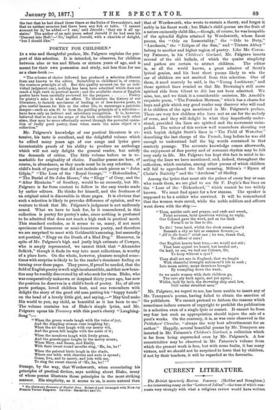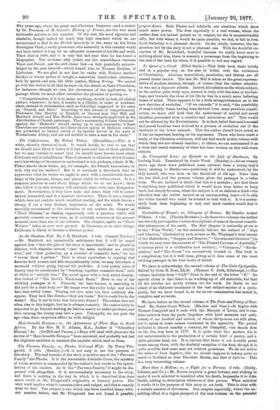CURRENT LITERATURE.
The British Quarterly Review. January. (Hodder and Stoughton.) —An interesting essay on the "Letters of Julian"—the tone of which con- trasts very strongly with what a religions review would have written fifty years ago, about the great anti-Christian Emperor—and a review by Dr. Freeman, of M. Gnizot's _History of France, are the two most noticeable articles in this number. Of the rest, the most vigorous and readable, though indeed all reach that high standard which we are accustomed to find in the British Quarterly, is the essay on the Swiss theologian Vinet, a really great man, who assuredly in this country would not have waited so long for an adequate memorial of his life and work. Vinet died in 1848, and it is only this last year that he has found a biographer. The reviewer ably points out the resemblance between Vinet and Pascal, and the still closer link—a link gratefully acknow- ledged by the man himself—which bound him to Thomas Erskine, of Linlathen. We are glad to see that he ranks with Erskine another thinker to whose power of insight a somewhat inarticulate utterance, both by speech and pen, did little justice, Bishop Ewing. We cannot go with the writer in all that he says—in hia attack on State-Churchism, for instance—though we own the cleverness of the application, in a passage which we must allow ourselves the pleasure of quoting :—
" Comprehension, if it is to mean anything, should include all ethical culture whatever ; in fact, it results in a Clerisy, or order of academi- cians, instead of eoclesiastics, such as Coleridge suggested in his essay on, ' Church and State.' According to this scheme of comprehension, Professors like Huxley or Tyndall, or literary men like Mill and Matthew Arnold and Max Muller, have been strangely neglected in the distribution of Church patronage. That a murmuring of these' Grecians' against the ' Hebrews' should spring up is only reasonable, if State Churches are maintained, and these choice spirits of Hellenic culture are permitted to lecture rarely or by special favour in the nave of Westminster Abbey, and are not invited to take a seat in the choir."



































 Previous page
Previous page